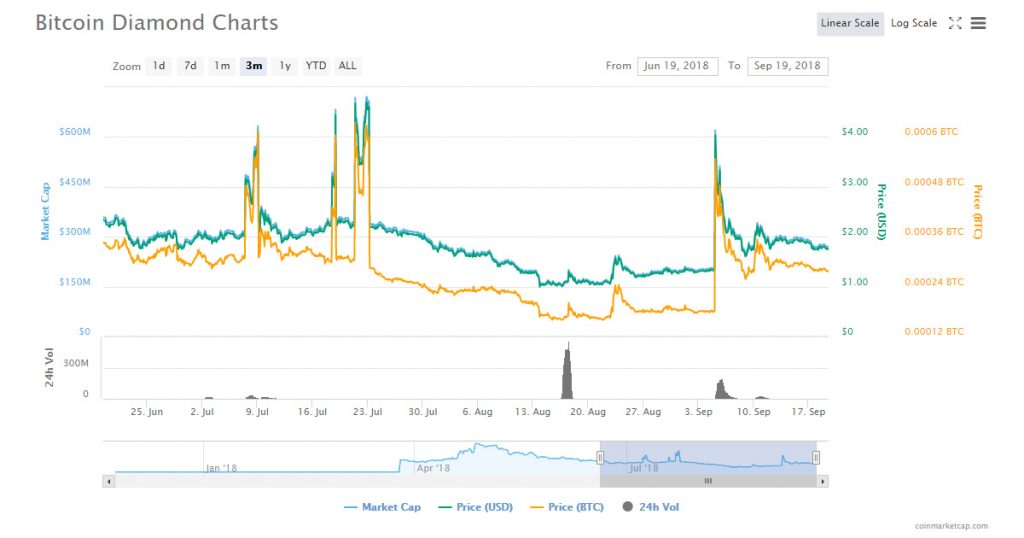Top Crypto Tokens That Aren't Even In the Top 100

Share this article
Crypto is going through some corrections, but that doesn’t mean the market is becoming any more rational. The fact that Dentacoin (DCN) is still at #70 by market capitalization should be proof enough that prices are only distantly related to potential (although it does have an oddly-compelling use-case that may prove to be a model for future tokens).
And of course, there are plenty of Bitcoin forks that still make it into the charts, some of which appear to be there solely for the purpose of pump and dump schemes. Looking at you, Bitcoin Diamond.

(CoinMarketCap)
As crypto goes on sale – again – there are a few quality gems among the dead coins and abandonware. And this might be your last chance to pick up them up at flea-market prices.
Here are the best bargains and (improbable? Possible?) unicorns among the cryptocurrencies that don’t currently make it into the Top 100 by Market Cap on our stalwart friend, CoinMarketCap.
Polymath (POLY)
Current Rank: 111
We’ve ranted at length about the shortcomings of cryptocurrency investments, including the fact that a “utility token” is merely a giant bulls-eye for the SEC.
Polymath is trying to change that, with a new class of Ethereum (ETH) tokens specifically designed to comply with securities regulations. Instead of having to take selfies and send bank statements every time you want to invest, Polymath’s vision is a single, universal KYC that can be used for any blockchain securities offering—complete with legal compliance, proof of income and geographic residence.
In the long term, Polymath has visions of being the founding-block for a larger “Security Token Marketplace,” a dApp where verified users can sell and trade company securities without the risk of breaching securities laws. Unlike classic utility tokens, this standard allows tokens to confer real investment rights—like equity and dividends—which have not been part of the bargain for earlier ICOs.
Pros: Crypto is pivoting towards regulatory compliance, suggesting a trillion-dollar market for security tokens. Whether Polymath will be at the front of that market is a different question.
Cons: Despite the emphasis on security trades, POLY is ironically a utility token. Make of that what you will.
Civic (CVC)
Current Rank: 118.
Along with the need for a universal security standard, there’s one more missing piece to the economic puzzle: a universal standard for identification. So far most blockchain companies still identify their customers the old-fashioned way—which is a bit like printing out an email and then sticking it in an envelope.
Civic’s solution is a decentralized network for identities, with users paying a small fee to be verified by trusted identity-checkers. Although it’s not certain that this system will actually work—there are certain incentives for cheating on all sides—the Civic system represents an important departure from centralized verification processes, however experimental it may be.
Civic first came to our attention when they started giving out free beer from an automatic age-checking vending machine. It looked like (and was) a marketing gimmick, but it also called attention to the unnecessary transaction costs involved in ID verification.
Pros: Civic has an impressive list of partners, including some of the biggest names on and off the blockchain.
Cons: It’s not the only game in town. There are already several competing projects, like traceto.io and TheKey, developing trustless identity systems.
Request Network (REQ)
Current Rank: 149
If Bitcoin is digital cash, the Request Network is a digital, peer-to-peer checking account. Cash transactions are fine for shopping trips, but if your business is working in crypto, you’re going to need a way to track your invoices.
The Request Network is building an all-in-one accounting dApp for the Ethereum blockchain. Instead of just sending money, the smart contract will enable users to issue bills, calculate paychecks, track multiple accounts and even run automatic audits for regulatory and tax compliance.
This is one project which is surprisingly low, considering how recently it was among the more hyped ICO projects. Although excitement has died down, it’s one of the few low-cap projects with a working product and high-profile partnerships with PwC and Shopify.
Pros: The Request Network has a sensible target on an important niche of the crypto payments system, unlike some other projects we can name…
Cons: The Ethereum blockchain has already shown its limitations, and may not be the best foundation for payment applications–at least for now.
Kyber (KNC)
Current Rank: 100
Crypto adoption still faces a few obstacles: 1700, to be precise. There are simply too many cryptocurrencies, and few have enough users to benefit from network effects. Even for promising projects like Nano or Stellar, there’s no benefit to having low fees if you can’t find someone else to trade with.
The Kyber Network aims to solve the liquidity problem for every single Ethereum token. Forget about finding someone that accepts the same obscure tokens that you use—if two people have tokens, they can instantly trade through Kyber’s decentralized exchange.
At least, that’s how it’s supposed to work, and the Kyber exchange met some success during its mainnet launch last month. Since then, however, use has stagnated; only 77 people have used the Kyber dApp in the past 24 hours as of the time of writing. While there’s a big niche for inter-protocol exchanges, it’s clear that Kyber still has a long way to go before adoption.
Pros: Kyber has an answer to one of the biggest problems in cryptocurrency payments. The exchange has recently announced support for every single ERC-20, as well as representative tokens for other protocols like Bitcoin.
Cons: Although Kyber shows plenty of promise, there are many competing DEX protocols with a head start in network effects. In addition, as Crypto Briefing has already reported, the exchange is also likely to face plenty of regulatory problems.
The author is not invested in any cryptocurrency profiled in this article, but does own Bitcoin and Ethereum.
Share this article
